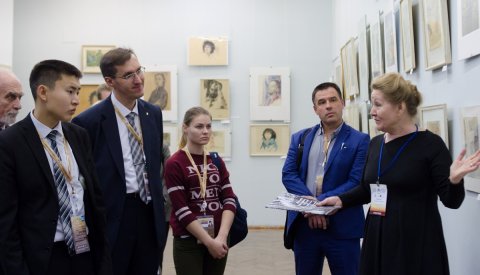On November 8, the Forum of Rectors of Russian and Kazakhstan Universities was held at South Ural State University within the frameworks of the 14th Russia-Kazakhstan Interregional Cooperation Forum. Rectors of the leading universities gathered to discuss problems and prospects of modern education and sign agreements on cooperation. During the event, guests of the Forum were given the opportunity to get a closer look at South Ural State University by visiting various excursions, and assess scientific and engineering achievements of the university’s scientists.
Overall, SUSU has more than 30 laboratories and research and education centers, and 8 international research laboratories supervised by leading world’s scientists from Germany, USA, Australia, India, etc.
Excursions were organized to university’s museums and to various research and education centers and high-tech laboratories, including the Laboratory for Supercomputer Modeling, REC of Nanotechnology, REC of Geoinformation Technologies, etc.
Efim Pivovar, the President of the Russian State University for the Humanities, corresponding member of the Russian Academy of Sciences chose the excursions to the SUSU Museum of Nationalities and Technology of the South Urals and the Art Museum.
“I am a historian by training, so I wanted to visit museums of your university. The Museum of Nationalities and Technology of South Urals is a very interesting museum as it displays a very well-stocked collection. Moreover, it is presented very systematically from the position of educational training. From the one hand, it gives an excellent characteristic of what existed in the South Urals and the adjacent territories; from the other hand, the connection with the world’s civilizations is visually displayed. I congratulate the university on having such museum!” shared Efim Iosifovich his impressions.
.jpg)
Baizhan Ualkhanov, Director of the Education Department of the National Agricultural Research and Education Center (Astana):
“I visited the Research and Education Center of Nanotechnology, because nowadays chemistry is one of the most prospective areas in the world’s science. It was interesting to have a look at the laboratory equipment and compare it with what we have in Kazakhstan. During the excursion, the main idea of the Forum, about human capital being inseparably connected with education and science, once again proved itself, as the major value of any laboratory is, of course, its scientists.”

All participants and guests of the Forum of Rectors of Russian and Kazakhstan Universities highly estimated exposition of museums and modern infrastructure of laboratories, event organization and the hearty welcome.




